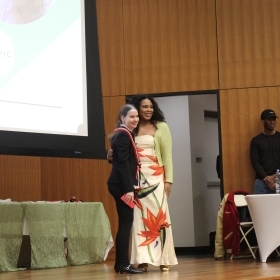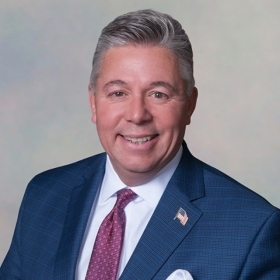Student Perspective: Lessons I’ve Learned as an Orientation Leader

For business Management major Joel G. Stephen, choosing to become a campus Orientation Leader was the perfect fit. In today’s Q&A, Joel shares more on the benefit of taking on a campus leadership role and how it continues to positively impact his college journey.
There are numerous opportunities in college to develop strong, transferable leadership skills— such as communication, teamwork, and problem solving—that can significantly contribute to the success of any career.
- You can turn to your passions as the president of a campus club/organization.
- Guide a college sports team to victory as team captain.
- Organize and lead the chapter of an on-campus sorority or fraternity.
- Inspire and impact incoming students as an orientation leader.
I. Joel's experience as a St. John's student.
Q: Tell me a little about yourself.
Joel Stephen: I am a junior in The Peter J. Tobin College of Business, and have been an Orientation Leader for one year. Additionally, I actively participate in other programs and organizations; I am a Student Coordinator for Project AIM, a Discover New York Peer Leader, and, more recently, a Resident Assistant.
Q: I’d love to hear about your first year as a student.
Joel Stephen: My first year as a St. John’s student was a bit difficult due to the pandemic, and I was not privy to the “ideal” St. John’s experience. My orientation was on Zoom, and the campus was a ghost town. This experience worried me about whether I made the correct choice by committing to St. John’s University; however, I decided to give it more time and have yet to look back.
I was surprised by how easily I could adjust and acclimatize as an international student. Programs such as Project AIM helped with my early development and academic success, and I encourage other international students to join.
II. Joel's experience as an orientation leader.
Q: What made you interested in becoming an orientation leader, and how did you learn about the program?
Joel Stephen: I was eager to apply and become involved with the orientation program from the moment the application was available.
My Orientation Leader during my first year of college was exceptional and went out of her way to make me feel welcomed and accepted. I wanted to be able to do the same for incoming students.
I already had experience assisting first-year students as a Discover New York Peer Mentor, so the fit felt almost seamless. As a student, it is virtually impossible not to know when orientation applications are open. There are flyers, emails, and info sessions where you can hear from Orientation Leaders directly.
Q: Please give us a walk-through of your first day in the orientation leadership program.
Joel Stephen: My first official day in the orientation leader program was exciting. It began with everyone moving into Donovan Hall.
Most interactions between the leaders were shy, yet friendly, as we knew that this would be our staff for the next few months. I learned more about the other leaders through our two weeks of training, where we did many team-building activities and learned the protocol for dealing with the many scenarios that could occur.
Over time, our connection as a staff grew, and we discovered what situations we work best in. Eventually, guided by the leadership of our Orientation Coordinators, we were ready to engage with our respective groups of incoming first-year students.
III. Common questions on campus leadership.
Q: What would you say is the biggest misconception about being a student leader?
Joel Stephen: The biggest misconception is thinking you need to be the most extroverted person in the room to be a good fit. For example, our 2022–23 orientation staff has some of the most diverse backgrounds and personalities, adding to the overall effectiveness of our teamwork and management skills.
Q: How do you balance coursework while taking on various leadership roles?
Joel Stephen: Leadership roles on campus are an additional responsibility to classwork, and you must find the most effective and efficient balance for you. I put all my events for the week on a calendar; this helps me visualize my schedule and adjust where necessary.
IV. Joel's lessons learned through leadership.
Q: Do you believe your campus leadership roles has contributed to your success at the Tobin College of Business?
Joel Stephen: While my leadership positions have helped with my classes at Tobin, I do not use them for this purpose. I use my leadership positions almost as “hobbies” as I genuinely love participating on campus.
However, I must admit that there have been many benefits to being a leader on campus. Besides time management, I learned communication skills and how to work with different types of people.
I continue to learn more about myself and what leader I envision myself to be in my future career. Practical experiences are always better than just theory, and these experiences have taught me what aspects and life skills I possess.
Q: How would you say your campus leadership roles have positively impacted your campus experience overall?
Joel Stephen: My leadership roles have positively impacted my campus experience more than I expected.I feel a sense of pride in making a positive impression on incoming first-year students.
Some of these students have become Orientation Leaders, inspired by their excellent leaders; others aspire to become Resident Assistants (RA), motivated by their programs.
Q: Have you learned anything about yourself through your college leadership roles?
Joel Stephen: I learn that there is no “one size fits all” policy regarding leadership and teamwork. I was exposed to various leadership styles and realized there could be multiple ways to solve problems.
As an Orientation Leader, I learned to have trust in my partner and my rotation team. A lot of people don’t like teamwork, and rightly so. However,when given a dedicated team of individuals with different ideas—all motivated toward the same goal—we can have a very passionate and effective team that makes it all worthwhile.
V. Student to student advice.
Q: Can you share a piece of advice you would give to new students?
Joel Stephen: My advice for first-year students or anyone in college is to get involved on campus. St. John’s University has something for everyone, including you.
Whether you aspire to be a leader, a mentor, or an essential team player, your experience and input are valuable to the University.You should make the most of your time at St. John’s and become an active participant in this diverse and supportive community!











